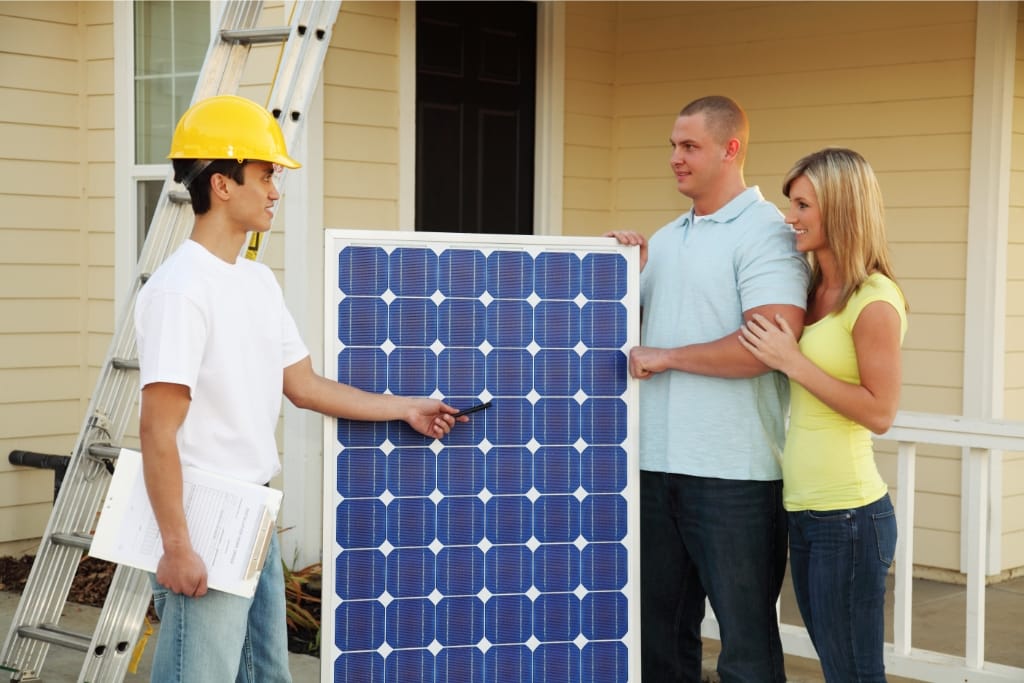In an era where sustainability and energy efficiency are more than just buzzwords, transitioning to solar power is a smart move for homeowners looking to reduce their carbon footprint and save on energy costs.
However, the process of selecting the right solar system installer can be as critical as the decision to go solar itself.
With a myriad of companies vying for attention, promising the best deals and highest-quality installations, how do you ensure that you're making the right choice?
This article aims to guide you through the maze of options with 10 essential tips for finding the best solar system installers, helping you to make an informed decision that aligns with your energy needs, budget, and sustainability goals.
Let's dive in...
1)) Do Your Research
Before choosing a solar system installer, take the time to research different companies in your area.
Look at their websites, read reviews from past customers, and compare prices and services offered.
Tips for Conducting Your Research:
- Check the installer's certifications and licenses to ensure they are qualified to install solar systems.
- Look for customer feedback and reviews on independent websites, not just testimonials on the installer's site.
- Compare the warranties offered by different installers to see who provides the best protection for your investment.
- Investigate the types of solar panel brands and technologies the installer offers to ensure they align with your quality and efficiency expectations.
- Attend local home and garden shows or solar energy seminars to meet potential installers face-to-face and ask questions directly.
Conducting thorough research is a crucial step in selecting the right solar system installer.
By verifying certifications, reading unbiased customer feedback, comparing warranties, understanding the technology on offer, and meeting installers in person, you'll be well-equipped to make an informed decision.
The effort you put into this initial stage can greatly influence the satisfaction and benefits you derive from your solar investment.
2)) Check Credentials
Make sure the solar system installer you choose is licensed and certified to perform the work.
This will ensure that they have the necessary skills and expertise to install your solar system safely and correctly.
Tips for Checking Credentials:
- Verify the installer’s licensing with your state’s licensing board to confirm they are legally permitted to operate in your area.
- Ask to see proof of their certification from reputable organizations such as the North American Board of Certified Energy Practitioners (NABCEP).
- Inquire about the installer's insurance coverage to ensure that you and your property are protected during the installation process.
Ensuring that your solar system installer has the proper credentials is not just a matter of legality but also of safety and quality.
By verifying their licensing, certification, and insurance, you are taking important steps to protect your investment and your home.
This process gives you peace of mind, knowing that the installation will be done professionally and up to industry standards.
Remember, the right credentials are a hallmark of reliability and expertise in the solar installation industry.
3)) Ask For References
A reputable solar system installer should have no problem providing you with references from past customers.
Contact these references to get an idea of their experience working with the company and the quality of their work.
Tips for Asking for References:
- Request a list of recent customers or projects that the installer has completed to gauge their experience and reliability.
- Reach out to these references and inquire about their overall satisfaction with the solar installation process and the service they received.
- Ask specific questions about the project timeline, communication, and whether the final results met their expectations.
- Consider asking for photos of the completed installations to assess the quality of workmanship.
- Finally, inquire if there have been any issues since installation and how the company addressed them, to understand the installer's commitment to customer service post-project.
Seeking references from past customers is a critical step in choosing a solar system installer.
It not only provides insights into their capability and reliability but also offers a glimpse into their customer service and support post-installation.
Asking detailed questions and requesting to see examples of their work can help ensure that the solar system installer you choose will meet your expectations not just in terms of the solar installation itself, but also in their ongoing commitment to their clients.
This careful vetting process can lead you to a partnership that enhances your home with solar energy effectively and efficiently.
4)) Get Multiple Quotes
Don't settle for the first quote you receive. Instead, get quotes from multiple solar system installers so you can compare prices and services.
This will help you find the best deal for your budget.
Example for Getting Multiple Quotes:
Imagine you are looking to install a solar energy system in your home. You start by contacting three different solar system installers in your area to request quotes for your project.
- Installer A offers a comprehensive package at a premium price, including top-of-the-line panels and a long-term warranty.
- Installer B provides a more cost-efficient solution, using slightly less efficient panels but at a significantly lower cost.
- Installer C quotes a price in the middle range, uses quality panels, offers a decent warranty, and includes maintenance services for the first year.
By comparing these quotes, not only in terms of cost but also considering the value, warranty, and additional services offered, you can determine which installer offers the best solution for your needs and budget.
This exercise ensures you're not simply going for the cheapest or the most expensive option but making an informed choice based on multiple factors.
Obtaining multiple quotes is more than just a strategy for financial efficiency; it's a crucial part of ensuring you receive the best value and service for your solar installation project.
This approach allows you to thoroughly understand the market, differentiate between the offerings of various installers, and ultimately choose an installer that not only fits your budget but also meets your quality and service expectations.
In the dynamic field of solar energy, where technology and services vary widely, this comprehensive comparison is essential for making an empowered and informed decision.
5)) Consider Experience
Choose a solar system installer with plenty of experience in the industry. An experienced installer will have a better understanding of local regulations, building codes, and installation techniques.
Checklist for Considering Experience in a Solar System Installer:
- Look for an installer with several years of experience in the solar industry specifically.
- Verify that the installer has a proven track record with installations similar in scale and complexity to your project.
- Check for any industry awards or recognitions that the installer might have received, which can indicate a high level of expertise and customer satisfaction.
- Inquire about the installer’s experience with local building codes and permit processes to ensure a smooth installation.
- Assess the depth of the installer's knowledge by asking technical questions about the solar system you're considering. Their answers can reveal the extent of their expertise.
- Finally, ensure that the installer has experience with the type of solar technology (e.g., photovoltaic, thermal) you plan to use, as different technologies can require different expertise.
Choosing an experienced solar system installer is paramount to the success of your solar project.
Experience not only ensures a smoother installation process, adhering to local regulations and building codes but also provides you with peace of mind, knowing that your investment is in capable hands.
An installer with a robust track record in the industry brings invaluable insights into the best practices and technologies, tailoring their approach to meet your specific needs.
Prioritizing experience in your selection criteria guarantees a higher level of professionalism and results that align with your expectations for sustainable energy solutions.
6)) Evaluate Warranties
Make sure to ask about warranties offered by the solar system installer. A good warranty will protect you in case anything goes wrong with your system after installation.
Examples for Evaluating Warranties:
- Performance Warranty: Check if the installer offers a performance warranty that guarantees the solar panels will produce a certain percentage of their rated power output over time, typically 25 years.
- Workmanship Warranty: Look for a workmanship warranty that covers the labor and installation quality. This type of warranty usually ranges from 1 to 10 years.
- Manufacturers’ Warranties: These warranties are provided by the manufacturers of the solar panels and inverters. Ensure the installer passes these warranties on to you, including any conditions that might affect their validity.
- Roof Warranty: In case the installation includes modifications to your roof, verify that the installer provides a warranty covering any damage or leaks caused by the installation process.
- Extended Warranty Options: Ask about the availability and terms of any extended warranties that can offer additional protection beyond the standard offerings.
Evaluating warranties is a critical step in selecting a solar system installer, as it safeguards your investment and ensures long-term satisfaction.
A comprehensive warranty plan not only protects against potential defects but also secures the performance and durability of your solar installation.
By paying close attention to the type and extent of warranties offered, you can gain peace of mind and confidence in the reliability and efficiency of your solar energy system for years to come.
Thoroughly understanding and selecting the right warranties means you're not only investing in solar technology but also in the future of your home's energy independence.
7)) Look For Customization Options
Every home is unique, so it's important to choose a solar system installer that offers customization options to meet your specific needs and preferences.
Examples of Looking For Customization Options:
- System Size and Design: Ensure the installer can tailor the size of the solar system to match your energy needs and roof space, optimizing efficiency and aesthetics.
- Panel Types: Confirm that the installer offers a variety of solar panel types, such as monocrystalline, polycrystalline, or thin-film, to suit your budget, efficiency needs, and roof characteristics.
- Energy Storage Solutions: Look for options to include battery storage solutions that can store excess energy for use during non-sunlight hours, enhancing energy independence.
- Smart Solar Systems: Check if the installer can integrate smart solar solutions, including smart inverters and energy management systems, for enhanced monitoring and control over your system.
- Mounting Options: Inquire about different mounting options, such as ground mounts or carport mounts, especially if your roof isn’t ideal for solar panel installation.
- Aesthetic Considerations: Some installers offer solar panels and systems designed with aesthetics in mind, such as low-profile panels or those that mimic the look of traditional roofing materials, ensuring your home’s appearance is considered.
Finding a solar system installer who offers comprehensive customization options is crucial for aligning your solar energy project with your specific needs and the unique characteristics of your property.
Customization ensures that every aspect of the solar installation—from system design and panel type to energy storage and aesthetic considerations—is tailored to maximize efficiency, cost-effectiveness, and visual appeal.
By prioritizing customization, you not only optimize the performance of your solar energy system but also enhance the value and satisfaction it brings to your home.
8)) Check For Financing Options
Installing a solar system can be a significant investment upfront. Look for installers that offer financing options or incentives to help make the process more affordable.
Tips for Checking Financing Options:
- Understand the Available Financing Types: Familiarize yourself with the different financing options available, such as solar loans, solar leases, and power purchase agreements (PPAs), to understand which best suits your financial situation and goals.
- Compare Interest Rates and Terms: When considering solar loans, compare the interest rates and repayment terms offered by different lenders to ensure you are getting a competitive deal.
- Look for Incentives and Rebates: Identify any federal, state, or local incentives and rebates that can reduce your overall costs. Some installers may offer assistance in applying for these benefits.
- Read the Fine Print: Carefully review all agreements for any hidden fees, potential increases in rates, or penalties for early repayment to avoid unexpected costs in the future.
- Ask About Ownership and Maintenance Responsibilities: For leases and PPAs, clarify who is responsible for system maintenance and understand how ownership is transferred if you decide to sell your home.
Exploring financing options is a vital step in making solar energy a feasible and affordable option for your home.
Understanding the types of financing, along with the rates, terms, and available incentives, enables homeowners to make informed decisions that align with their financial goals.
Carefully reviewing the conditions and responsibilities associated with each option ensures a clear understanding of the financial commitments and benefits.
By taking these factors into consideration, homeowners can secure the best financing solution, making the transition to solar power both economically beneficial and smoothly integrated into their lives.
9)) Consider Customer Service
Good customer service is essential when choosing a solar system installer. Make sure they are responsive to your inquiries, provide clear communication throughout the process, and address any concerns promptly.
Examples for Considering Customer Service:
- Prompt Response Times: Look for installers who are quick to respond to your inquiries and demonstrate a willingness to provide information and assistance when needed.
- Clear and Regular Communication: Choose a company that keeps you informed throughout the installation process, including updates on timelines, any issues encountered, and how they are being resolved.
- After-Sales Support: Ensure that the installer offers reliable after-sales support, including maintenance, warranty claims, and answering operational questions about your solar system.
- Professionalism: Professional conduct, from on-site workers to customer service representatives, is a key aspect of good customer service. This includes respecting your property and addressing any concerns with courtesy.
- Customized Solutions and Advice: A customer-centric installer will work with you to understand your needs and preferences, offering customized solutions rather than a one-size-fits-all approach.
Choosing the right solar system installer encompasses more than just technical expertise and financial options; the quality of customer service plays a pivotal role in ensuring a satisfying and stress-free installation process.
A company that values prompt communication provides comprehensive after-sales support, and tailors its services to meet individual needs demonstrates a commitment to customer satisfaction.
This commitment can significantly influence your overall experience, making it essential to consider customer service as a critical factor in your decision-making process.
10)) Trust Your Instincts
Trust your instincts when choosing a solar system installer. If something doesn't feel right or if you don't feel comfortable with a certain company, it's okay to keep looking until you find one that meets all of your criteria.
Example for Trusting Your Instincts:
After interviewing several solar system installers, you find that one company's representatives are consistently late to appointments and often unable to answer your detailed questions about the installation process and equipment.
Despite this company offering the lowest quote, you feel uneasy about their reliability and level of expertise.
Trusting your instincts, you decide to opt for another installer who, although slightly more expensive, has demonstrated punctuality, professionalism, and a deep understanding of your needs and concerns.
Trusting your instincts is a crucial aspect of selecting a solar system installer.
This intuitive approach complements the factual research and comparisons by adding a layer of personal confidence in your decision-making process.
When the facts align but your gut feeling signals caution, it's important to listen.
This inherent guide can steer you towards a decision that not only meets your practical requirements but also gives you peace of mind.
Feeling confident and comfortable with your chosen installer is key to a satisfactory and successful solar installation experience.
Conclusion
Finding the best solar system installers doesn't have to be overwhelming if you follow these 10 tips.
By doing thorough research, checking credentials, asking for references, getting multiple quotes, considering experience and warranties, looking for customization options and financing options, evaluating customer service, and trusting your instincts, you can find an installer who meets all of your criteria and provides top-notch service from start to finish.
Related Articles and Guides
- How To Choose A Solar Installer
- How To Negotiate The Best Price For A Solar Panel System
- 10 Tips To Help You Determine Whether To Fire And Replace A Solar Installer
Are You Looking For The Best Solar Power Installers In Sacramento Ca? Click Here To Get In Touch With A Solar Expert Today!
Download Our Free E-book!








